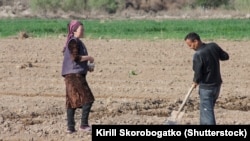Farmers in Uzbekistan say the government is forcing them to surrender land to Chinese businesses under the guise of state-backed development, taking thousands of hectares of fertile cotton and wheat fields out of the hands of locals.
Concerned over the fate of the lush lands of the Ferghana Valley, they told Radio Free Europe/Radio Liberty that large patches of land have been taken into the state reserve and transferred to Chinese businessmen.
Official documents say the land transfers are voluntary. But dozens of accounts given to RFE/RL from those who signed over their land appear to describe a different reality: coercion, threats, and intimidation by Uzbek law enforcement officers acting on orders from local officials.
"The governor told me: 'This is a presidential order. Either give up the land or go to jail,'" said one farmer who spoke on condition of anonymity over fear of reprisal for commenting publicly on the issue.
Creeping Influence?
Land transfers in the Ferghana Valley, which is shared between Uzbekistan, Kyrgyzstan, and Tajikistan, are the latest flashpoint in what is becoming an increasingly visible and volatile undercurrent across Central Asia -- a surge of anti-Chinese sentiment driven by land disputes, debt dependency, labor market tensions, and fears of creeping influence.
Under Uzbekistan's Law on Farming, a farmer leases state land for 49 years. Neither the local government nor the prosecutor can take it away. According to the legislation, the land can only be seized by the state by court decision.
Farmers, though, say and seizures are being carried out based on a verbal order from Shuhrat Abdurahmonov, the head of the region.
"I did not want to give up my land and put up some resistance, but in response, the district governor called more than 20 police officers and the National Guard to the district administration building and ordered them to arrest me and my wife," a farmer from Qurgonteppa district told RFE/RL.
"That is why none of the farmers resist now; otherwise, they could be imprisoned. It is unlikely that any of us would be able to get out of there alive and well."
Regional administrations failed to comment on the claims by farmers when contacted by RFE/RL.
Concerns over China taking over the use of large swaths of land extend beyond the farming community.
Beijing's economic presence in Central Asia has grown rapidly in recent years under China's ambitious Belt and Road Initiative.
As of early 2025, China is Uzbekistan's largest trade partner, with bilateral trade reaching $12.5 billion. Over 3,400 Chinese firms operate in the country, surpassing even the number of Russian entities.
Similar patterns have emerged in other Central Asian countries, such as Kazakhstan.
'Economic Trap'
Chinese investments promise infrastructure, jobs, and technology. But experts warn of a darker side.
Kyrgyz political analyst Nargiza Muratalieva points out that Central Asian countries are increasingly falling into what she calls China's "economic trap:" easy access to credit -- often with opaque terms -- that can eventually leave weaker states vulnerable to political pressure or asset forfeiture.
Muratalieva points out that Beijing gained over 1,100 square kilometers of land in Tajikistan in 2011 in exchange for debt relief, a clear example of the potential consequences of falling into this "trap."
China is already the largest lender in Uzbekistan, with outstanding loans totaling $3.8 billion.
"The general characteristics of Chinese lending for all countries in the region are the ease of obtaining debts, their difficult repayment, as well as the lack of transparency of procedures and specific conditions," according to Muratalieva.
Debt repayments, land transfers, and rising Chinese economic control also feed local perceptions of "neocolonialism," especially when local communities are excluded from decision-making processes.
The harsh treatment of Uyghurs and other non-Han indigenous ethnic groups in China's Xinjiang Province strikes a deep chord with Central Asians, who share linguistic, cultural, and religious ties with them.
Whether it's propaganda or not, the fear that China could one day treat Kazakhs or Uzbeks the same way has further sown seeds of opposition to Beijing's expanding presence.
"It turns out that the Chinese really like my land; they want to take the land from other farmers too. Naturally, we are against it, but the district governor, the prosecutor, and the police chief continue to put pressure on us," one farmer from Uzbekistan's western Andijon region told RFE/RL.
"What worries us most is that they can subsequently seize our country and do to us the same as they did to the Uyghurs in Xinjiang."












